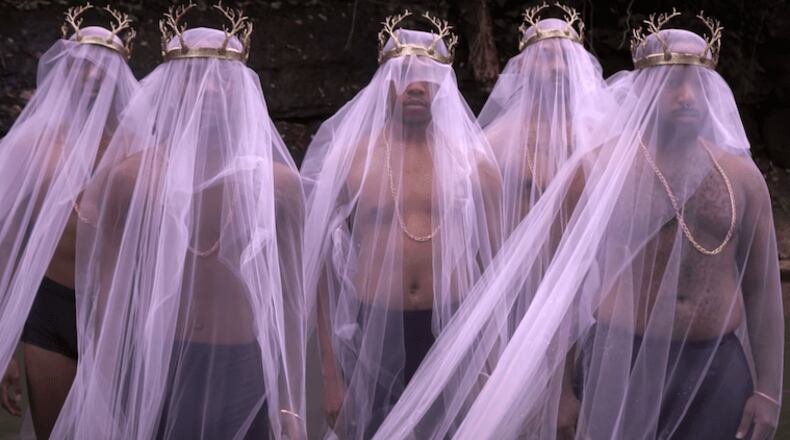Lyrik London means business. Despite the alliterative name that flows off the tongue, there is an edge to this man, and he is not inclined to hide it. London’s dance-driven “Black Boi Majik,” part documentary, part autobiography and entirely unsettling, is in this year’s Out on Film festival, which highlights LGBTQ filmmakers in and around Atlanta. Part of the Local Shorts package, it is available to stream through Oct. 10.
First released in October 2020, “Black Boi Majik” reveals London’s unique journey as a young man who, in his childhood, announced he wanted to be a dancer. The film tells the story, as one might imagine, of this aspiration being unmet with the kind of support offered to more “lauded” goals. Add to that the injustices he (read any young Black man) faced and faces daily, the premise of the film takes on a broader perspective. Compositionally, “Majik” is quick to fold in the experiences of Black women, Black youth, Blacks who identify and intersect with the LGBTQIA+ community, images from murders that made national news, as well as the conspicuously underreported, tragic assaults that didn’t. In short, a lot of material for this 34-minute endeavor.
London’s film is a feast for the eyes, due in large part to his fertile imagination which conjures images difficult to assign to any specific time or place. Five Black men appear in royal blue tutus with matching opera gloves, then in skin-tone tights with hats fashioned from banana leaves, then bridal veils and tight, white briefs while seated in church pews. The volley between images of tender, doe-eyed romance and guns pointed at the camera, or alarmingly, held against someone’s head, characterize the vision of the film. This is a bumpy ride. There is no Hollywood ending, the experience leaves you with a hunger for knowing what happens next, and in the autobiographical sense, that remains to be seen.
There is no question that London has a lot to say and perhaps the abundant, rapid-fire content is meant to suggest that the river of muck flows swiftly. In one scene, the powerful sorrow in a young girl’s eyes asking for simple human kindness flickered in and bounced out with jarring speed. I hungered to sit in that moment and many others like these. Often, there is an urgency to get to the dance portions of the film and this inclination chips away at the potency of what we encounter in the moments before, whether told through personal experience or via iPhone videos of devastating happenings.
“Black Boi Majik” has a rhythm that this viewer appreciated until the pacing fell into a predictable pattern: poetic narrative, documentary-style footage, personal commentary followed by dances laced with intricate moments and occasional bursts of clever editing. Often, provocative images were dulled when song lyrics superfluously took on the role of narrator. For this viewer, the curated images and personal commentary were far more effective. Subsequently, the concentric circles of the film produce two entirely different worlds: the one where London is a prolific choreographer and the other where he is angry — and justifiably so. How do these worlds collide? How does London navigate them simultaneously? Does he prefer to keep them separate?
There is an unmistakable conflict that exists in the film, naturally. Still, if anyone knows London’s social media presence, that knowledge serves to highlight this internal struggle in other ways. There is disdain for the entertainment industry, frustration with hierarchical struggles that exist in the field, distaste for self-righteous personal expression and equally, unbridled love for dance. The film becomes a calling card for London, a journey into self-preservation and ultimately a fantastical refuge with a close-knit community of the people he trusts the most. A deeper dive reveals evidence of London’s burgeoning empire with this film as a meaningful pillar. Since releasing “Majik” a year ago, London produced an album titled “Big Boys Don’t Cry,” released several music videos and manages Pink Trash, his own line of apparel.
“Black Boi Majik” begins and ends with what one may assume is London. A young boy, on a dirt road, is either walking toward or away from the camera. Surrounded by a grassy field which leads to the woods, he is dressed in a T-shirt and jeans with London’s signature do-rag: the one that trails down to his waist, and flutters in the wind as he runs. Inside the bookends, explosions of love, doubt, exasperation and betrayal present themselves in a concise telling embraced by stream-of-consciousness admissions. London’s film is a catalogue of five-minute forays into distinct, troublesome and heartbreaking waters that bolts you to your screen. Each of these chapters is the stuff of something much larger and therefore succeeds at whetting the appetite for the next turn of the page.
George Staib is a dancer, choreographer and professor at Emory University. In 2019, he was promoted to the rank of Professor of Practice and is the winner of two Winship Prizes for lecturers at the university.
Credit: ArtsATL
Credit: ArtsATL
Working closely with the American Press Institute, The Atlanta Journal-Constitution is embarking on an experiment to identify, nurture and expand a network of news partnerships across metro Atlanta and the state.
Our newest partner, ArtsATL (www.artsatl.org), is a nonprofit organization that plays a critical role in educating and informing audiences about metro Atlanta’s arts and culture. Founded in 2009, ArtsATL’s goal is to help build a sustainable arts community contributing to the economic and cultural health of the city.
Over the next several weeks, we’ll be introducing more partners, and we’d love to hear your feedback.
You can reach Managing Editor Mark A. Waligore via email at mark.waligore@ajc.com.
About the Author
Keep Reading
The Latest
Featured



